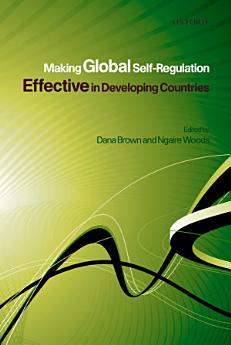Making Global Self-Regulation Effective in Developing Countries
Dana L. Brown · Ngaire Woods
Oct 2007 · OUP Oxford
Ebook
288
Pages
family_home
Eligible
info
reportRatings and reviews aren’t verified Learn More
About this ebook
As companies 'go global' they increasingly use factories and facilities spread across the world. But who regulates their activities in far flung corners of the world economy? In many sectors such as textiles and apparel, chemicals, and forestry, the answer is that companies regulate their own behaviour through codes and standards which they agree among themselves. The recent growth in corporate self-regulation of labour, environmental and financial practices has attracted the attention of scholars who have detailed the number and content of self-regulatory efforts in various sectors. Missing so far, however, has been an analysis of the effectiveness and impact of self-regulation. Does self-regulation actually work and under what conditions is it most likely to be effective? The answer to this question is particularly important for developing countries where corporate self-regulation is often seen as substitute for weak governance structures. The chapters in this volume evaluate the effectiveness of self-regulation compared to other forms of global regulation. Across sectors and states, corporate self-regulation works best when those who are regulated have a voice in deciding the content of codes and standards and when some mechanism of compliance exists at the level of the state. Unfortunately, opportunities for voice and state capacity for regulation are often lacking in developing countries. Given this, the book suggests some minimal forms of government action and participation by global actors that can make global corporate self-regulation more effective in bettering conditions in the developing world.
About the author
Dr. Dana L. Brown is University Lecturer in International Business at the Said Business School and the Clore Fellow of Management at Lady Margaret Hall, Oxford University. She received a BA summa cum laude in Political Science and Slavic Languages from Rutgers University and an M.Phil. in Russian and East European Studies from Oxford University where she studied as an Rhodes Scholar. Dr. Brown received her Ph.D. in Political Science from the Massachusetts Institute of Technology (MIT) specializing in the study of Comparative Political Economy. Ngaire Woods is Director of the Global Economic Governance Programme at Oxford University which was established in 2003 to conduct research into how global economic institutions could better meet the needs of people in developing countries. She is also Dean of Graduates and Fellow in Politics and International Relations at University College. Her most recent book is The Globalizers: the IMF, the World Bank and their borrowers (Cornell University Press, 2006). She was educated at Auckland University (BA in economics, LLB Hons in law) and at Balliol College, Oxford (M.Phil in International Relations with Distinction and D.Phil) before teaching at Oxford and at Harvard. She has served as an External Evaluator to the IMF Board (2005-6), and as Adviser to the UNDP's Human Development Report (2002-2006).
Rate this ebook
Tell us what you think.
Reading information
Smartphones and tablets
Install the Google Play Books app for Android and iPad/iPhone. It syncs automatically with your account and allows you to read online or offline wherever you are.
Laptops and computers
You can listen to audiobooks purchased on Google Play using your computer's web browser.
eReaders and other devices
To read on e-ink devices like Kobo eReaders, you'll need to download a file and transfer it to your device. Follow the detailed Help Center instructions to transfer the files to supported eReaders.






